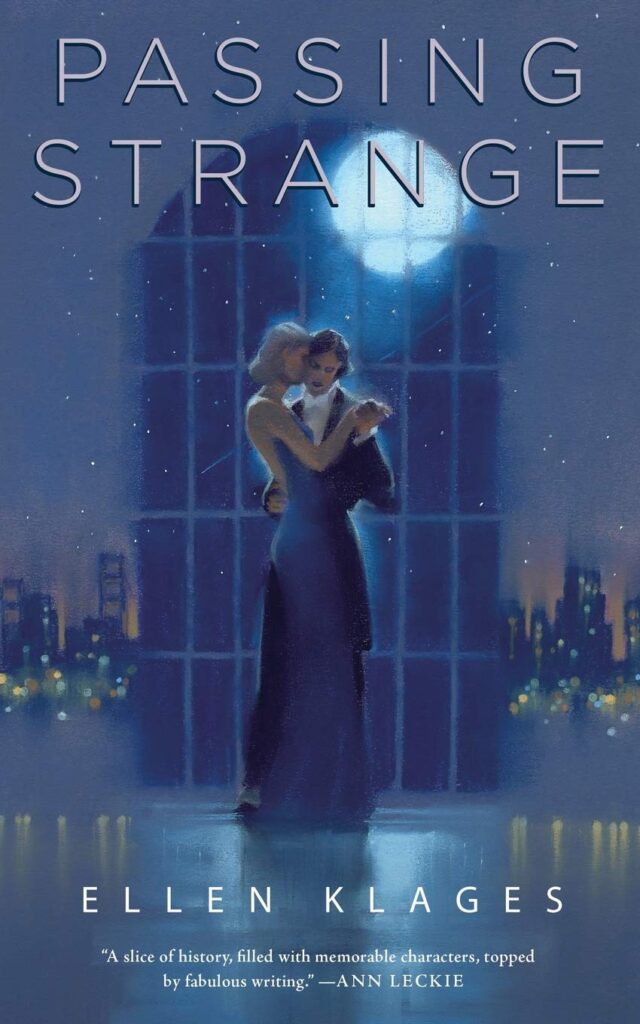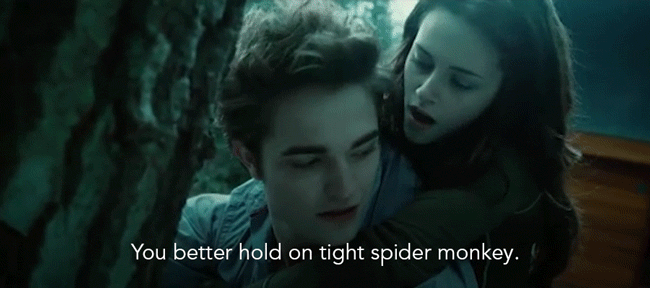Content Notes: This review contains significant spoilers for the entirety of Passing Strange, including the ending. I don’t think knowing what happens ruins the book, but more importantly, I don’t think it’s possible to discuss my messy, complicated feelings about it without these spoilers.
Speaking of messy and complicated, I’m going to discuss Klages’s depictions of homophobia, anti-Asian racism, sexism, domestic violence, sexual violence, police brutality, and suicide. If you’d rather not read about these subjects, I’d recommend skipping both the review and the book.

Passing Strange is a difficult-to-categorize novella . Google calls it an LGBT fantasy about five women’s interconnected lives in historical San Francisco, which I think is wrong on all counts except the setting, but definitely more marketably pithy than my description. I’m going to call it a lesbian time traveler’s guide to San Francisco in 1940. You, lesbian time traveler, will learn all the best places to eat, drink, and sightsee, along with some helpful tips for dealing with law enforcement.
You’ll also get a cute love story and some lengthy explanations of why two separate magic systems cannot be explained. Which won’t matter to you, as you presumably have your own magic system, unless you’re a science fiction sort of time traveler. If you’re a science fiction sort of time traveler, perhaps you’ll enjoy the late-nineteenth-century-sci-fi-story-style dinner parties in which scientists describe their research at unnecessary length.
I enjoyed the dinner parties, the cute love story, the sightseeing, and many other elements I’ll touch on later. That’s part of what made Passing Strange such a frustrating read.
The frame narrative takes place in 2014. In the beginning, the elderly Japanese-American lawyer Helen Young has just received confirmation that her unspecified illness is terminal, and we follow as she finalizes her estate, revisits her favorite places in the city, and takes her own life at home. Her primary errand is to retrieve a pastel painting from an underground Chinatown labyrinth and sell it to a rare bookstore owner for everything he has.
Strangely, this section of the book is the most fun. Helen clearly has a plan for her last days. She carries it out with self-satisfied precision and without explanation, similar to a criminal mastermind pulling off a heist. It’s not clear how the smug bookstore owner is going to regret his purchase, but it’s clear that Helen’s come out ahead in this transaction.
After Helen’s death, the book jumps back to 1940. Helen attends one of the aforementioned dinner parties with the artist of the pastel painting, a white woman named Haskel who primarily paints pulp magazine covers. Helen sometimes poses as an “inscrutable Asian villain” for Haskel’s covers. Neither woman seems particularly uncomfortable with this arrangement:
Helen let her arm drop to her side, the prop knife dangling. “I like playing dress-up, but Dr. Wu Yang needs some summer-weight clothes.”
[…]
“Next time you can be the terrified victim.” Haskel lit a cigarette and leaned against a worktable covered with pastel chalks, jars of paintbrushes and pencils. “But Oriental fiends are harder to find.”
“That’s a relief.”
Also at the dinner party is Emily, a young white woman who makes eyes at Haskel. Haskel brushes her off, but later they run into each other at Mona’s Club 440, where Emily sings in drag. They fall in love almost instantly and spend the rest of the book making love and exploring the city. Helen more-or-less ceases to exist until Haskel and Emily need her help after the climax.

This is my primary problem with Passing Strange: Klages clearly wants to tie the 1940s queer experience to the 1940s Asian-American experience, which makes sense both historically and thematically, but her only Asian-American character exists to facilitate the romance between the white leads.
Frieda Kahlo appears briefly to fulfill a role that is similar to Helen’s, but worse. Worse both because she was an actual, real person, and because at least Helen gets to win sometimes. Frieda just gets to be crazy and tragic and sexy in an exotic, crazy, tragic way. (Haskel slept with her, but only once. Her mustache tickled.)
Like Helen, Emily and Haskel both have to flatten and commodify their identities as marginalized people in order to survive. Emily has a beautiful voice, but as a lesbian, she can’t perform in any respectable club. Instead, she sings in a tux and a mustache as Mona’s, where:
Visitors who’d come to San Francisco for the world’s fair ventured nervously […] to gape at curiosities that would astound the guys at the office, the ladies in the bridge club back in Dubque or Chattanooga.
Haskel, a domestic violence survivor, fills her covers with scantily-clad women in terror, about to be devoured by monsters.
Unlike Helen, however Emily and Haskel actually get the room to have complicated emotions about their experiences. Emily bemoans the pressure to define herself as either and only a butch or a femme. After a confrontation with her husband, who’s been out of the country for “three or four years,” Haskel decides to stop painting images of violence. And in the end, Emily and Haskel get to opt out, escaping to a fantasy world of their own making.
Helen–who is, again, a Japanese-American woman living in San Francisco in 1940–has to stay behind and see to their affairs.
That makes it hard to recommend this book, even though there are parts I love. Klages’s prose is beautiful, detailed, and precise in a way that reminds me of DMing tabletop games. You could draw a map from her descriptions.
Haskel and Emily’s love story is genuinely sweet and swoony. Like, look at this:
“Not quite. A little more–” Haskel set the sketch pad down and knelt by the bed. “–like this.” With one hand, she turned Emily’s head slightly to the side, her fingers entwined, for a moment, in auburn curls. Emily felt her arms go all goosebumps. Their faces were inches apart. She could feel the warmth of Haskel’s breath on her cheek, smell coffee and a drift of smoke.
A moment passed. Neither of them moved. Then she heard Haskel sigh and felt a tickle of hair against her neck, lips brushing her own, lightly at first, and then, when she offered no resistance–none at all–with unmistakable desire.
“Golly,” Emily said, when there was air again.
I died. I died when I read it, and I died again when I sent it to all my friends, and I died a third time typing that up for you. In lieu of flowers, please send nail polish. I need a good green, but I’m not picky.
When Haskel and Emily get into trouble and it seems like there’s no escape, their found family of other lesbians step in to care for them in a way that feels both heartwarming and familiar. “People like us, we help each other,” Helen says. (This theme is part of why I find it so frustrating that they left Helen behind! In 1940!)

There’s so much sweetness and light, it’s not hard to see why people frequently recommend it as a cute, fluffy sapphic romance. Kind of like Passing Strange itself, I see where they’re coming from, and I’m also really frustrated by it.
Corey Alexander wrote a blog post back in 2018 called “On being careful what we call fluff,” which sums up my feelings about these recommendations well.
This is not a fluffy book. I’ve already touched on the racism, homophobia, sexism, and domestic violence, but I want to be clear that these are not just incidental as a result of the setting. They are pervasive and they hit hard. There’s a scene of homophobic violence and sexual assault against a side character that makes me so sick to remember that I can’t honestly say whether or not it furthered the plot or themes or whatever.
This is a heavy book with a cute romance and a more-or-less happy ending, closer to Keeping You a Secret than The Princess Affair.*
I think that if you’re the kind of person who generally enjoys 1990s lesbian fiction, or if you have an interest in queer history and a high tolerance for suffering, you’ll enjoy this book. If you’re more than a year into a global pandemic and feeling helpless about police brutality and anti-Asian racism, maybe check out The Princess Affair instead.
More Info
Publisher: Tor.com
Paperback Page Count: 215
Ellen Klages is an American science, science fiction and historical fiction writer who lives in San Francisco. Her novelette “Basement Magic” won the 2005 Nebula Award for Best Novelette. You can follow her on Twitter and buy the book on Bookshop or Amazon.
Resources
If you or someone you know is struggling, please reach out to one of these organizations:
- For LGBT Youth: The Trevor Project
- For trans people of any age: Trans Lifeline
- For Asian Americans (available in Cantonese, Mandarin, Japanese, Korean, Fujianese): Asian LifeNet Hotline
- For people experiencing domestic violence: National Domestic Violence Hotline
- If you need to report an AAPI hate incident: Stop AAPI Hate
- If you’re in the US and thinking of ending your life: National Suicide Prevention Lifeline
- If you’re outside the US and thinking of ending your life: International Suicide Hotline
*I haven’t actually read The Princess Affair, but my friend assures me it’s for-real fluffy.





